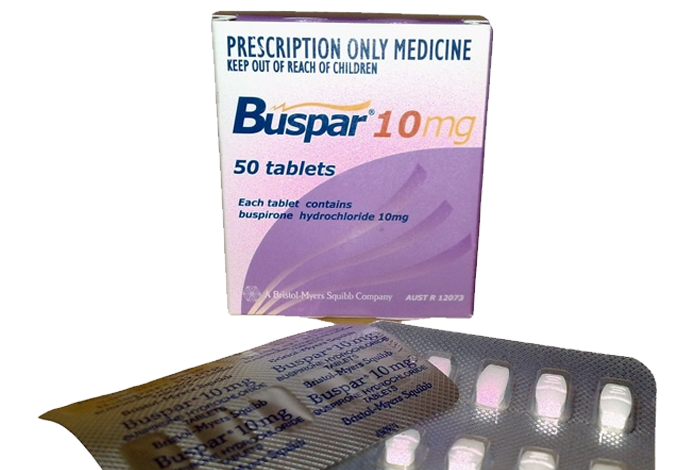Buspirone (BuSpar): Uses, Benefits, How it works, Side Effects

What Is Buspirone (BuSpar) And What Does It Treat?
Buspirone is used to treat anxiety disorders or in the short-term treatment of symptoms of anxiety. Buspirone is in a class of medications called anxiolytics. It works by changing the amounts of certain natural substances in the brain.
The Food and Drug Administration (FDA) approved Buspar for the treatment of generalized anxiety disorder (GAD) in 1986. A doctor can diagnose a person with GAD if they have been experiencing excessive anxiety and worry on most days over a period of at least 6 months.
Although Buspar is no longer available, the FDA confirmed that its withdrawal from the market was not due to concerns regarding safety or effectiveness.
How does Buspirone (BuSpar) work?
Buspirone is in a class of medications called anti-anxiety medications. They work by changing the levels of certain chemicals in the brain, called neurotransmitters. Buspirone is a serotonin receptor agonist, which means that Buspirone (BuSpar) binds to the serotonin receptor in the brain, stimulating that receptor. Scientists know that increasing serotonin in the brain seems to improve symptoms of conditions like anxiety. Buspirone (BuSpar) may also affect dopamine receptors—dopamine is another neurotransmitter involved in mental health.
Unlike benzodiazepines (like diazepam and alprazolam) and barbiturates, Buspirone (BuSpar) is not habit-forming. It has a low risk of dependence or abuse, making it more helpful in treating anxiety. However, buspirone does not work immediately. It begins to kick in after two to four weeks of use.
How Long Does It Take For Buspirone (BuSpar) To Work?
It may take 3 to 4 weeks of taking Buspirone (BuSpar) every day before you start to feel better.
What Is The Most Important Information I Should Know About Buspirone (BuSpar)?
Do not drive a car or operate machinery until you know how this medication affects you because you may notice that you feel tired or dizzy.
Alcohol may increase any drowsiness or dizziness when taken with buspirone. You should avoid the use of alcohol while taking buspirone.
It may take 3 to 4 weeks before you start to feel better. Initially, you may begin to notice a decrease in irritability and worry. Do not stop taking this medication without talking to your health care provider first. With input from you, your health care provider will assess how long you will need to take the medication.
Unlike other anti-anxiety medications, buspirone has very low abuse potential.
What Should I Discuss With My Healthcare Provider Before Taking Buspirone (BuSpar)?
• Symptoms of your condition that bother you the most
• If you have thoughts of suicide or harming yourself
• Medications you have taken in the past for your condition, whether they were effective or caused any adverse effects
• If you experience side effects from your medications, discuss them with your healthcare provider. Some side effects may pass with time, but others may require changes in the medication.
• Any other psychiatric or medical problems you have
• All other medications you are currently taking (including over the counter products and herbal and nutritional supplements) and any medication allergies you have
• Other non-medication treatments you are receiving such as talk therapy or substance abuse treatment. Your provider can explain how these different treatments work with the medication.
• If you are pregnant, plan to become pregnant, or are breastfeeding
• If you drink alcohol or use drugs
How Should I Take Buspirone (BuSpar)?
Buspirone (BuSpar) should be taken twice a day with or without food. Your health care provider will determine the dose that is right for you based on your response.
Use a calendar, pillbox, alarm clock, or cell phone alert to help you remember to take your medication. You may also ask a family member a friend to remind you or check in with you to be sure you are taking your medication.
What Happens If I Miss A Dose Of Buspirone (BuSpar)?
If you miss a dose of buspirone, take it as soon as you remember, unless it is closer to the time of your next dose. Discuss this with your health care provider. Do not double your next dose or take more than what is prescribed. Avoid drinking large amounts of grapefruit juice while taking buspirone.
What Should I Avoid While Taking Buspirone (BuSpar)?
Avoid drinking alcohol and using illegal drugs while you are taking buspirone. They may decrease the benefits (e.g., worsen your condition) and increase the adverse effects (e.g., sedation) of the medication.
What Happens If I Overdose With Buspirone (BuSpar)?
If an overdose occurs, call your doctor or 911. You may need urgent medical care. You may also contact the poison control center at 1-800-222-1222.
A specific treatment to reverse the effects of buspirone does not exist.
Can a pregnant woman take Buspirone (BuSpar)?
If you are planning on becoming pregnant, notify your health care provider to best manage your medications. People living with anxiety disorders who wish to become pregnant face important decisions. It is important to discuss this with your doctor and caregivers.
Can a breastfeeding woman take Buspirone (BuSpar)?
Regarding breastfeeding, caution is advised since it is unknown whether buspirone passes into breast milk. Buspirone should be only taken by breastfeeding people when necessary and after consulting with a healthcare provider.
What Are the Possible Side Effects Of Buspirone (BuSpar)?
Buspirone (BuSpar) may cause side effects. Tell your doctor if any of these symptoms are severe or do not go away:
• dizziness
• nausea
• diarrhea
• headache
• excitement
• confusion
• fatigue
• nervousness
• difficulty falling asleep or staying asleep
• feelings of anger or hostility
• lightheadedness
• headache
• weakness
• numbness
• increased sweating
Some side effects can be serious. If you experience any of these symptoms, call your doctor immediately:
• rash
• hives
• itching
• swelling of the face, eyes, mouth, throat, tongue, or lips
• fast or irregular heartbeat
• blurred vision
• uncontrollable shaking of a part of the body
• agitation, fever, sweating, dizziness, flushing, confusion, fast or irregular heartbeat, shivering, severe muscle stiffness or twitching, seizures, hallucinations, loss of coordination, nausea, vomiting, or diarrhea
If you experience a serious side effect, you or your doctor may send a report to the Food and Drug Administration’s (FDA) MedWatch Adverse Event Reporting program online (http://www.fda.gov/Safety/MedWatch) or by phone (1-800-332-1088).
.
What Other Medications May Interact With Buspirone (BuSpar)?
Buspirone can cause dangerous drug interactions—be sure to let your healthcare provider know about any other medications (prescription, over-the-counter, herbal products, etc.) you’re taking.
You should not use Buspirone (BuSpar) with medications known as MAOIs (monoamine oxidase inhibitors) as it can lead to serotonin syndrome, a potentially life-threatening condition. Serotonin syndrome symptoms include confusion or agitation, muscle twitching or rigidity, increased heart rate, elevated body temperature, nausea/vomiting, high blood pressure, sweating, and dilated pupils.
Don’t take Buspirone (BuSpar) within 14 days of taking an MAOI, including:
- Isocarboxazid
- Linezolid
- Methylene blue injection
- Phenelzine
- Rasagiline
- Selegiline
- Tranylcypromine
MAOIs are not the only medications that may cause a serotonin syndrome drug interaction. Taking antidepressants like SSRIs, SNRIs (serotonin-norepinephrine reuptake inhibitors), trazodone, or any other drug that increases serotonin levels can lead to serotonin syndrome.
Taking buspirone with medications that block or stimulate liver enzyme CYP3A4 may change the levels of buspirone in your blood because this enzyme breaks down the drug—your healthcare provider may need to adjust your dosage if you’re taking these medications.
Medicines that affect CYP3A4 include diltiazem, verapamil, erythromycin, itraconazole, nefazodone, rifampin, ketoconazole, ritonavir, dexamethasone, and certain seizure medicines.
This does not include all potential drug interactions, and others may exist. Talk to your healthcare professional or pharmacist for more information about Buspirone (BuSpar).





